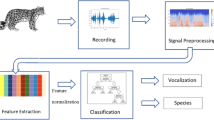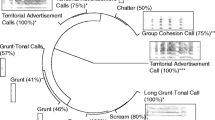
Overview
- Focuses on vertebrate vocalization-based applications
- Addresses challenges in vertebrate vocalization research
- Integrates new technology for future research and innovation
Part of the book series: SpringerBriefs in Applied Sciences and Technology (BRIEFSAPPLSCIENCES)
Access this book
Tax calculation will be finalised at checkout
Other ways to access
About this book
Similar content being viewed by others
Keywords
Table of contents (3 chapters)
Authors and Affiliations
About the authors
Mahagammulle Gamage Manisha Milani earned an Honours BEng in Mechatronics Engineering from Edinburgh Napier University. After completion of the BEng degree, she worked as an engineer in the automation, robotics, and telecommunication industries, and was a lecturer in a private higher education institution in Sri Lanka. In 2018 she was awarded a fully-funded scholarship from the Ministry of Foreign Affairs and Trade (MoFAT) of Brunei Darussalam to study full-time for an MEng in Systems Engineering at Universiti Brunei Darussalam. She is interested in multidisciplinary research topics such as biomedical engineering, neuroscience, signal processing, machine learning, applied robotics, and automation. She has onsite research experience at several institutions, including Edinburgh Napier University; Western University, Canada; Sungkyunkwan University, South Korea; Universiti Brunei Darussalam; and University of Moratuwa, Sri Lanka.
Krishani Murugiah graduated from Anna University with Bachelor's and Master's degrees in Biotechnology. She was invited by the Department of Biotechnology, Pavendar Bharathidasan College of Engineering and Technology, to work as an assistant professor in the Department of Biotechnology, and worked as a research assistant at Micro Therapeutics Research Laboratory, India. She is has a keen interest in chemical engineering and is currently doing project work in wastewater treatment using biocoagulants.
Dr. Madhumathy Perumal is a Professor at Dayananda Sagar Academy of Technology and Management. She completed her Bachelor's in engineering from Anna University, a Master's (Gold Medalist) from Arupadi Veedu Institute of Technology, and a PhD from Anna University in 2015. She has more than 14 years of teaching experience. Dr. Perumal’s research areas of interest include computer networks, wireless communication, wireless sensor networks, the Internet of Things, wireless channel modeling, mobile communication, and topics related to networks and wireless communication domains. She has published more than 75 papers in international and national journals and conferences. She is a life member in ISTE and a senior member of the IEEE. She serves as a reviewer for journals published by IEEE, IET, Springer, Inderscience, and Elsevier, has registered and published three Indian patents, and is the author of Wireless Sensor Networks Routing Protocol Overview (Grin Verlag, 2020) and Fundamentals of Wireless Sensor Networks (Lambert Academic Publishing, 2020).
Bibliographic Information
Book Title: Acoustic-Based Applications for Vertebrate Vocalization
Authors: Ramashini Murugaiya, Manisha Milani Mahagammulle Gamage, Krishani Murugiah, Madhumathy Perumal
Series Title: SpringerBriefs in Applied Sciences and Technology
DOI: https://doi.org/10.1007/978-3-030-85773-8
Publisher: Springer Cham
eBook Packages: Engineering, Engineering (R0)
Copyright Information: The Author(s), under exclusive license to Springer Nature Switzerland AG 2022
Softcover ISBN: 978-3-030-85772-1Published: 02 December 2021
eBook ISBN: 978-3-030-85773-8Published: 30 November 2021
Series ISSN: 2191-530X
Series E-ISSN: 2191-5318
Edition Number: 1
Number of Pages: VIII, 61
Number of Illustrations: 1 b/w illustrations
Topics: Signal, Image and Speech Processing, Biomedical Engineering and Bioengineering, Biotechnology, Biomechanics, Neurosciences



